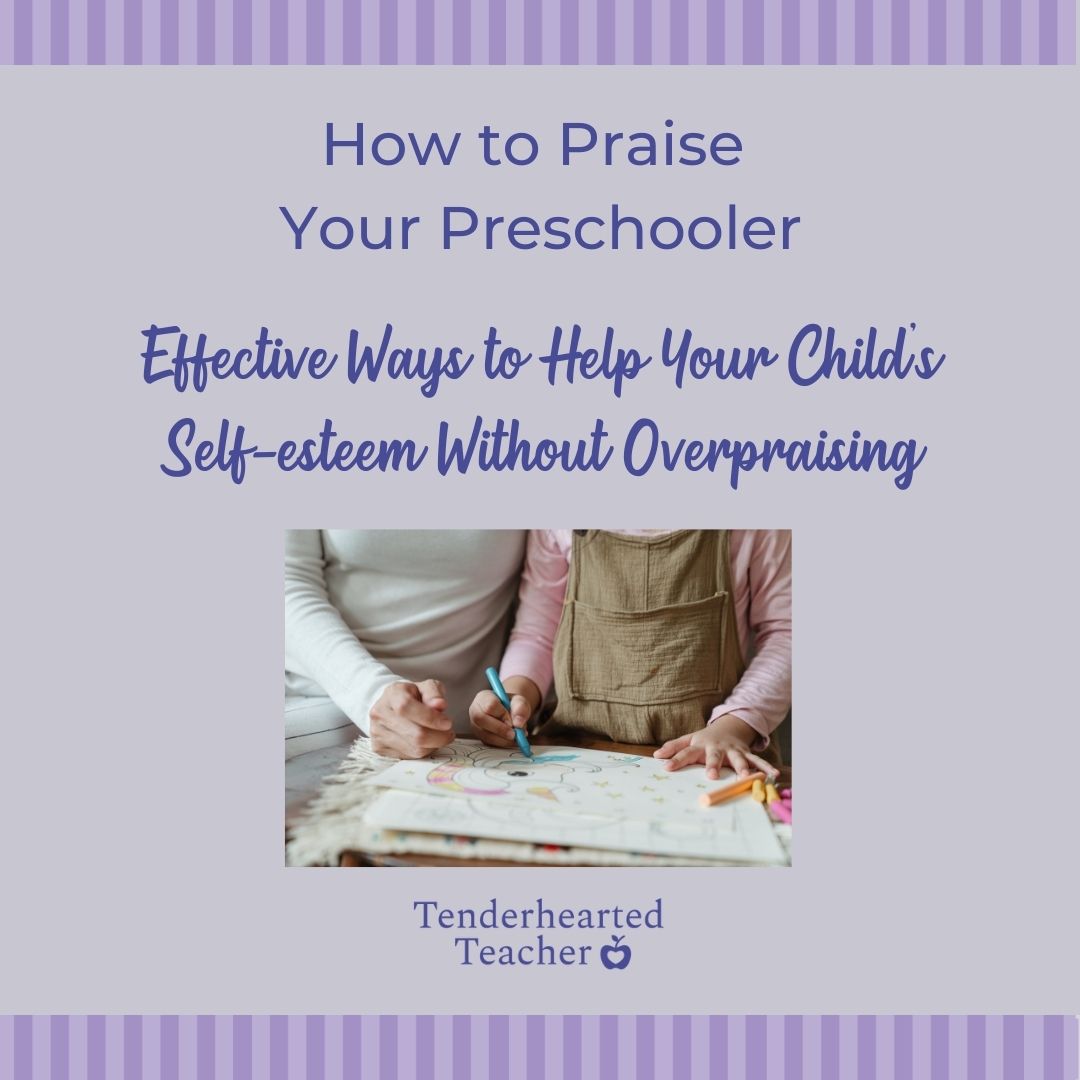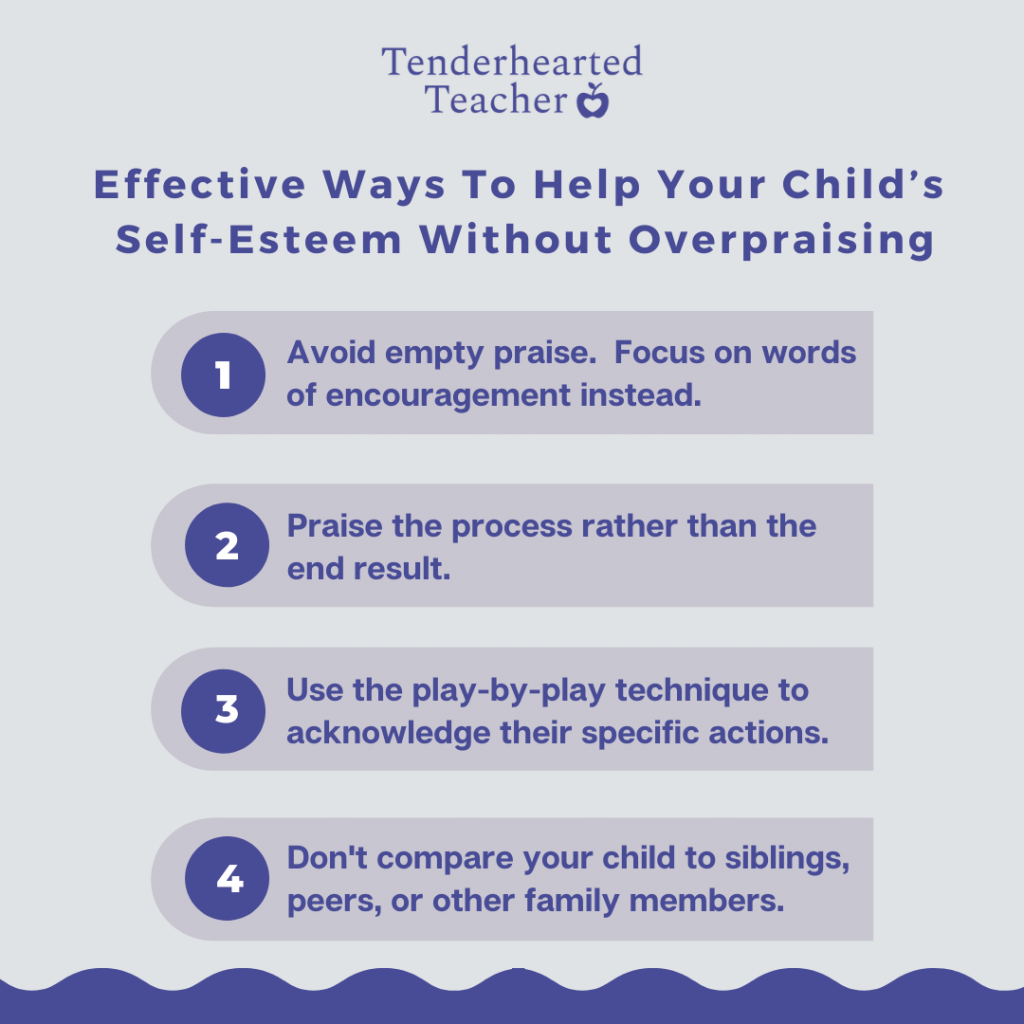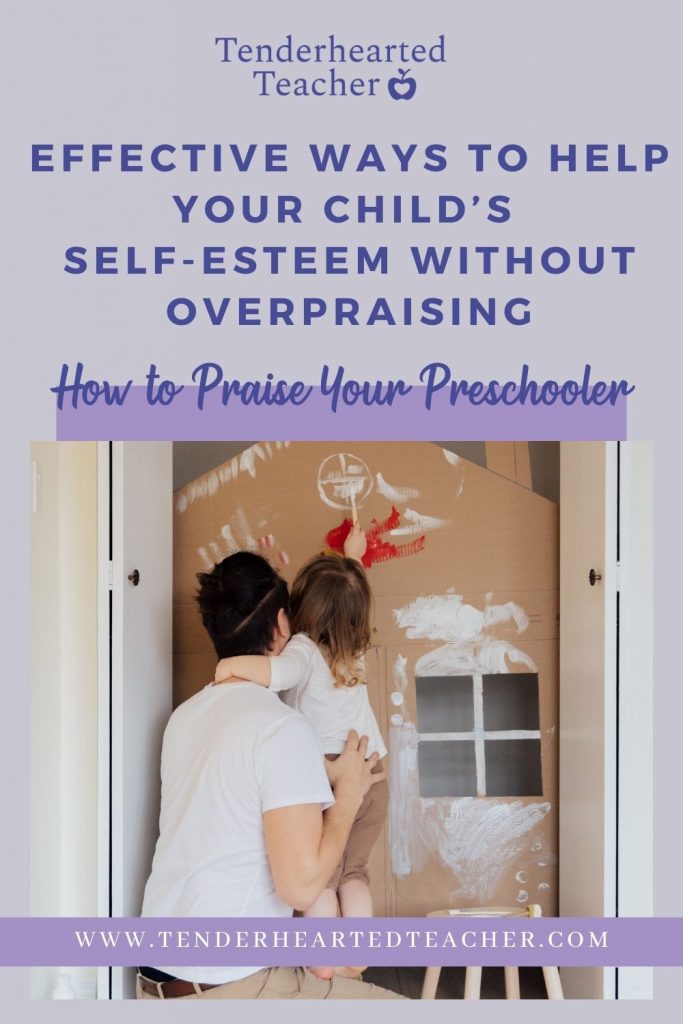Effective ways to help your child’s self-esteem
without overpraising

If you’re anything like me you’re thinking, “Oh, praise! That’s great! I praise my preschooler all the time. They must feel so confident in themselves.”
I think we’d all agree that praising your little one makes you and your child feel good and there’s certainly nothing wrong with that. I mean, who doesn’t like to receive a compliment now and then?
But, is too much praise a good thing?
It turns out, it can be. While a meaningful compliment can do wonders for someone’s self-esteem, excessive praise might have the opposite effect. Therefore, there are certain things to keep in mind when praising your child.
Parents Who Praise Effectively Do Several Things
I recently read an article that was released earlier this year. In it, a psychotherapist, Jessica VanderWier, discusses three different ways parents can effectively praise their children to help develop their self-esteem and confidence.
So, families should consider doing a few different things when doling out encouragement. VanderWier states that parents who effectively praise their children do three things.
- They praise the process.
- They use observational language.
- They never make it a competition.
I’m going to add my own bit of advice to this too. They avoid “empty praise.”
What is Empty Praise?
If you’re thinking “Wait, how can praise possibly be negative?” I’m sure you’re not alone. Actually, when I first started teaching, I was so eager to dote on my students that you’d often catch me saying, “Good job!” That is until I learned about the negative impacts of “empty praise.”
Empty praise is a short, often exaggerated statement like “Good job!” or “You’re so smart,” or “That’s amazing!” Think of it as a surface-level, almost superficial, compliment because the praise doesn’t have anything else attached to it.
This type of praise can be counterproductive. In fact, it can often leave children with an overinflated sense of self or, on the flip side, feeling inadequate or even anxious. For example, if you always resort to telling your child, “You’re so smart” anytime they complete a task two things can happen. Your child might not be motivated to put in extra effort to achieve a goal because they think it comes easily to them. Or they may feel as though they have disappointed you if they make mistakes or fail.
So What Should You Do to Praise Your Preschooler?

With young children, it’s especially important to avoid empty praise, so be more specific when giving encouragement. If you believe your child is doing well at something you want to refer to the tips above. Remember to praise the process rather than the product which means focusing on the effort the child puts in rather than the outcome. Use observational language about what they are doing to give your compliment more weight. I like to call this the play-by-play technique. Talk to them about their specific actions and their effort. Finally, don’t compare them to anyone else. Instead, let them self-reflect and consider the effort they have put in and the improvements they have made over time with practice.
What Does That Look Like in the Moment?
Let’s say your preschooler is independently using their scissors to cut paper. You might be so impressed that you quickly blurt out, “Good job, Suzy.” But now since we know that’s empty praise, what can you say instead to improve that statement?
First, praise the process. “Good job cutting that paper, Suzy.”
That’s getting better, but we’re still not quite there yet.
Let’s add that observational language to really make it count. “Wow, Suzy! Look at you cutting that paper on your own! You remember how to hold the scissors properly after all that practice. You’re pointing your thumb up to the sky while you snip.”
How about one more?
Your child is building with blocks. You want to avoid saying “good job” and you also want to avoid asking what the structure is. Let them tell you about it in their own way so as not to stifle their creativity. So, you can say, “Look at you building with blocks! Can you tell me about what you’re building with these big blocks here?”
Also, note that in a scenario like it’s ideal to mention how your child handles a challenge. For example, if the tower falls down you can say, “I noticed you didn’t get frustrated this time when the tower fell down like you did yesterday. Instead, you made a new plan and tried again. You should be proud of yourself.” This can encourage your child to develop resilience for when things don’t go as planned.
It may seem a little strange to talk to your child in this way when you first start, but just remember that in the long term, it can benefit them and their overall self-esteem.
The Key Takeaways About Praise and Your Preschooler
No one is telling you not to praise your child. Instead, it’s about shifting how you praise. Parents and caregivers should focus on using encouraging words rather than empty praise. So let’s recap:
Make sure to dig a little deeper than the surface-level compliment. Focus on words of encouragement. You can do this by praising the process rather than the end result as well as by using observational language. Finally, don’t make things a competition by comparing your child to their siblings, friends, classmates, or other family members.
Now talk to me! Do you feel like you use the right amount of encouragement with your children? Did you feel like the way your parents praised you impacted your life as an adult? Share your comments or questions below.
Also, please don’t forget to check out my shop page to find out more about, “I Give Thanks: A Gratitude Journal for Kids.” I created this journal to help teach children about gratitude and to help develop their confidence and self-awareness.
Read Related Posts
- Simple Ways to Teach Your Preschooler About Gratitude
- How to Talk to Preschoolers About Traumatic Events
- Why Social-Emotional Learning Matters (Especially in Preschool)
Reference: VanderWier, J. (2021, July 15). A psychotherapist says parents who raise confident, mentally strong kids always do these 3 things when praising their children. CNBC. Retrieved November 5, 2021, from https://www.cnbc.com/2021/07/15/a-psychotherapist-shares-how-parents-of-confident-and-mentally-strong-kids-praise-their-children.html.
SAVE TO PINTEREST




Such great advice!
Thank you for your comment Abby!
Thank you for your advices, it is easy going with everybody using the GOOD JOB! and those empty prices.
Yes, it’s so easy to do Ms. Veronica! We just have to be more intentional about the type of praise we give! We live and learn!
This is something a lot of parents have no idea about! I definitely didn’t until I read up on positive parenting. This is a very helpful piece, thank you for putting this information out there!
Ahhh, empty praise…..When I first started out as a preschool teacher, I didn’t quite get it. I quickly learned and adapted. Thanks for your very informative article.
Thank you for your comment, Victoria. I’m glad you enjoyed this post.
wonderful!